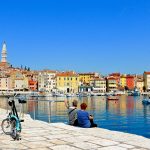April the 15th, 2024 – Sun, sea and… food. The Croatian gastro tourism offer has a hell of a punch to pack, but it’s limited owing to large regional differences.
As Sinisa Malus/Poslovni Dnevnik writes, despite what you might think, the Republic of Croatia is not (yet) a tourist superpower, at least not as much as it should (and could) be. With that being said, the proper moves in the right direction are now very visible, especially in the post-pandemic period. An integral part of the tourist offer should also be the Croatian gastro tourism offer, and while it is being embraced more and more frequently, there are still issues to overcome.
Any foreigner visiting Croatia, even one with very specific and refined tastes, will be more than delighted with the Croatian gastro offer, be that Croatian food or the incredibly varied amount of locally produced wine.
The Croatian tourism authorities haven’t been hiding their serious ambitions when it comes to Croatian gastro tourism for a long time now. Certain domestic wines and olive oils, despite their very limited quantities, have already established themselves as being world class over the last decade. At the same time, the restaurant scene in the country is rapidly transforming and the quality of the overall offer has grown significantly, and continues to do so year by year.
However, much like with everything else in Croatia, some exceptionally large regional differences are noticeable. Istria is far above the rest of Croatia in terms of its offer, especially in terms of its global recognition and high quality. Gastronomy in the greater part of Dalmatia has yet to become a solid reason for tourist arrivals. This isn’t so much the case, for example, in Istria, Kvarner, and even in the neighbouring Šibenik County, which boasts a very well known Michelin restaurant.
Perhaps the most picturesque thing to say is that we should treat Croatia as if it was something like a high-end boutique hotel. The Croatian gastro tourism offer is extremely rich, but in limited quantities. If we act as if we are a big hotel with a thousand and not a mere ten rooms, we simply won’t have enough of that wine and food, or the qualified and appropriate people to be able to offer quality to the masses from abroad in this sense.
The decision-makers would first have to define the precise direction in which the Croatian gastro tourism is going, and what we want from those concrete moves. Istria succeeded in doing this a very a long time ago, and it’s time for the rest of this beautiful country to understand and accept it going forward.











